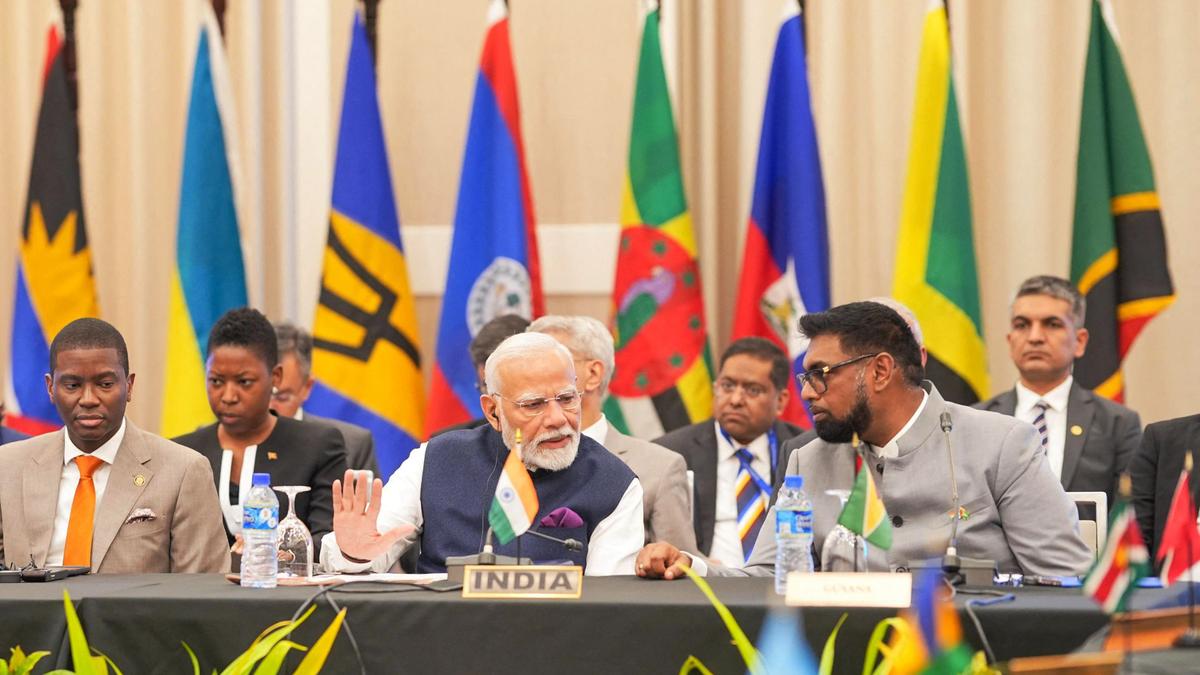
A three-nation visit as a foray into summit diplomacy Premium
The Hindu
Prime Minister Narendra Modi’s visit to Nigeria, Brazil, and Guyana was India’s latest foray into summit diplomacy covering three different geographic regions and encompassed an extensive interaction
Prime Minister Narendra Modi’s visit to Nigeria, Brazil, and Guyana (November 16-21, 2024) was exceptionally well designed to achieve multiple objectives. It was India’s latest foray into summit diplomacy covering three different geographic regions — Africa, Latin America, and the Caribbean — and encompassed an extensive interaction on bilateral, regional and global issues. While the Prime Minister’s primary purpose was to represent India at the nineteenth summit of the Group of 20 (G-20), in Brazil, his spending ample time in the two other countries enhanced the impact of this trans-continental journey. A close look at how the visit unfolded, and its outcome, is an index to understanding India’s current foreign policy priorities.
The halt at Abuja, Nigeria, was not a pit stop. It was a full-scale state visit to Africa’s most populous nation and the fourth-largest economy. This West African nation’s international heft has been increasing, as evidenced by its presence at the G-20 summit last year at India’s invitation and the BRICS’ invitation to join it as a partner state. Nigeria’s recent chairship of the Economic Community of West African States (ECOWAS) is relevant too. As two large democracies and multi-religious, multi-ethnic, and multi-linguistic societies devoted to ‘unity in diversity’, India and Nigeria are natural partners.
The Nigerian leadership gave ample signals to convey its appreciation of India’s expanding economic and political influence and its robust Africa policy. The formal gifting of the keys of the city of Abuja to Mr. Modi, the ceremonial welcome at the State House complete with a 21-gun salute, and the conferment of a top national award were clear giveaways. The award citation referred to his leadership and stellar contribution to fostering India-Nigeria ties and noted that India has been positioned as a global powerhouse under his transformative governance.
Nigeria, an important beneficiary of India’s development assistance and human-resource development-related programmes, has been keen to advance the ‘strategic partnership’. India seemed ready and willing. The dialogue at Abuja confirmed the two leaders’ assessment that much potential existed for expanding bilateral cooperation in trade, investment, education, energy, health, culture, and people-to-people ties. New areas such as agriculture, urban transportation, renewable energy, and digital transformation were identified. Besides, they renewed their commitment to joint combat against terrorism, extremism, and radicalisation. Despite closeness at the political level, only three memoranda of understanding (MoU) were signed due probably to bureaucratic delays on the host side. Overall, the visit was a clear plus for the India-Nigeria friendship.
The nineteenth summit of G-20, comprising 19 powerful economies and two regional organisations, was hosted in Rio de Janeiro (November 18–19). It took forward the people-centric decisions adopted at the New Delhi summit by mainstreaming key perspectives of the Global South into the G-20 decision-making. The Rio Declaration highlighted the three priorities defined by the Brazilian presidency: social inclusion, sustainable development and reform of global governance institutions.
On the first issue, the Global Alliance against Hunger and Poverty was launched. It will serve as a platform for “mobilizing finance and knowledge sharing” on a wide scale. Regarding sustainable development, the G-20 reiterated its previous positions but failed to make headway on climate finance. On the third issue, the new achievement was the adoption of the road map for “Better, Bigger and more Effective Multilateral Development Banks”, with the group calling for its early implementation. On the United Nations and World Trade Organization (WTO) reform, there was nothing new in the G-20’s pronouncements.
As conflicts rage in Europe and West Asia, leaders sought peaceful resolution and focused attention on the significant issues of economic development and climate change. While experts debated what the G-20 summit achieved, many expressed the view that it was time for the group to concentrate on implementing its decisions.

The Karnataka government has drafted a comprehensive master plan for the integrated development of Kukke Subrahmanya temple, the State’s highest revenue-generating temple managed by the Hindu Religious Institutions and Charitable Endowments Department. The redevelopment initiative is estimated to cost around ₹254 crore and aims to enhance infrastructure and facilities for devotees.












